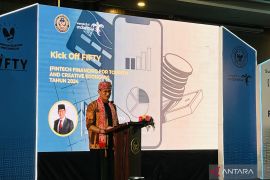The Indonesian Consumers Institute (YLKI) had earlier called on the government to drop its plan to impose a 10 percent VAT.Jakarta (ANTARA News) - The government will impose a 10 percent value-added tax (VAT) on toll road fares, effective April 1, 2015, noted a tax directorate general official.
The plan to impose a 10 percent VAT is provisioned in the Directorate Generals Regulation No. PER-10/PJ/2015 on the procedures of VAT collection on toll road services, Wahju Tumakaka, a spokesman of the directorate general of taxation, stated here on Thursday.
Based on the regulation, toll road operators are also obliged to report about their businesses if they have to be registered as tax payers. They would then be required to collect, transfer, and report about the payable tax, he elaborated.
The toll road operators will also be required to produce tax invoices for every toll road fare transfer. The toll road tickets will constitute a document equal to the tax invoices.
In this case, the toll road tickets will have to include the toll fares and their VAT. Therefore, the tickets would have to display that the mentioned value includes the VAT.
The Indonesian Consumers Institute (YLKI) had earlier called on the government to drop its plan to impose a 10 percent VAT.
It stated that the toll road operators had yet to provide good services.
"The toll road operators have yet to meet the required minimum service standards. The average speed of vehicles on toll roads is now declining. Vehicle queues at toll gates are increasingly snaking down," Tulus Abadi of the YLKI noted in a press statement last Thursday.
The toll road infrastructure is also in a dire state. Several potholes can be found on the toll roads. Thus, the imposition of a 10 percent tax is inappropriate.
Besides this, he said the imposition of the tax will have an impact and lead to an increase in logistics costs. It will eventually affect the consumers as the prices of goods and other basic necessities will increase.
"The imposition of VAT will adversely run counter to the governments policy to reduce logistics costs," Abadi added.
He explained that the imposition of the tax is basically a covert toll fare hike. It can even be a double increase as the toll fares are raised annually in certain sections.
"If the toll road fares are raised and the tax is imposed, it will mean that the increase has been double. This violates the law on traffic and land transportation as well as the government regulation on toll roads," he stressed.
According to Tulus, the government should not burden the people with taxes in various sectors for the sake of increasing state receipts from the tax sector amounting to Rp1.3 thousand trillion.
Earlier, Deputy Finance Minister Wardiamo stated that the imposition of a 10 percent VAT on toll road fares from April 1 will not affect the prices of goods and basic necessities.
"For instance, if the toll road tariff is Rp five thousand, the VAT will only be Rp500. This will not raise the price of logistics," he explained.
He added that the government aims to collect Rp500 billion as VAT applied on toll road fares.
"Toll taxes are collected to finance the development of infrastructure. If everything is limited, the government will not be able to increase its tax receipts," he pointed out.
The VAT on toll road fees will be collected as part of the efforts to achieve the tax receipt target set in the Revised 2015 Stage Budget (APBN-P), Wardiamo explained.
This tax will be included in the toll road fares, effective April 1 and will be applicable on all types of vehicles.
Furthermore, Finance Minister Bambang Brodjonegoro is still willing to review the inclusion of VAT in the toll road fares.
The imposition of the additional tax will cause the toll road fares to increase, even though the tax is not a toll road fare, which increases once in every two years.(*)
Editor: Heru Purwanto
Copyright © ANTARA 2015











